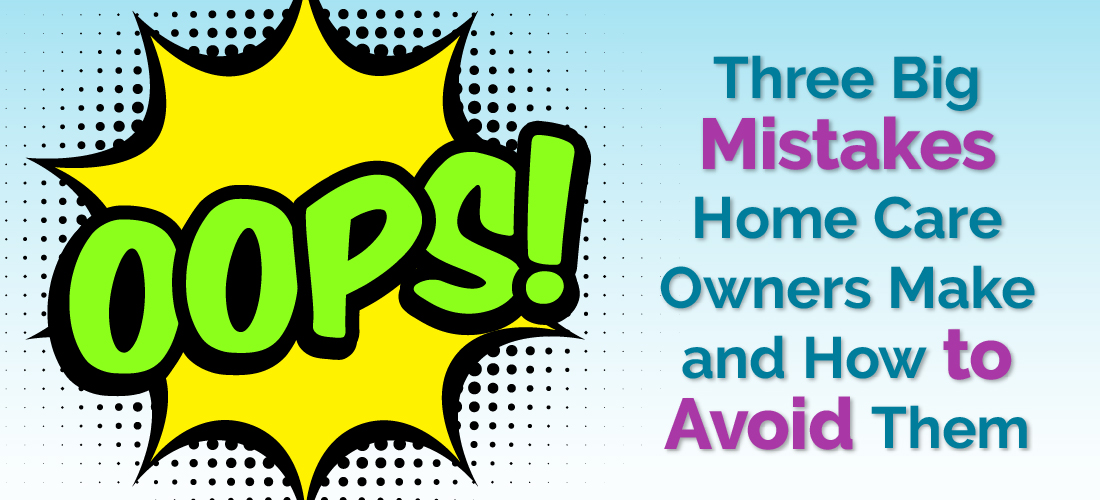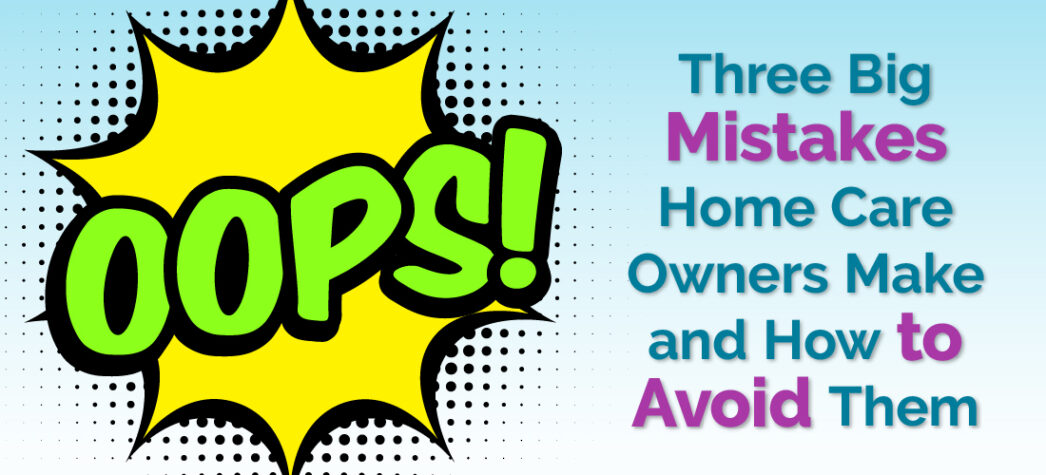
A while ago, I was browsing a home care Facebook group. Somebody asked the pros and cons of starting a home care agency.
Everybody mentioned challenges like recruitment as cons, but one comment was particularly on the nose.
“You will work all the time. Nonstop. 24/7/365,” one commenter responded.
They’re only right in some cases, but they hit on a great point anyway:
- Home care of any kind is hard.
- Running an agency is even harder.
My team and I have worked with hundreds of agencies over combined decades of experiences as well as grown a handful of service businesses ourselves.
Here are the biggest mistakes we see home care owners make over and over that makes running an agency even harder than it needs to be.
#1: Letting the Business Run You Instead of Running the Business.
This is a phrase I learned from Aaron Marcum, owner or past owner of several major home care agencies as well as eLearning and data company Home Care Pulse.
If you’re operating an agency, doing a lot of work is unavoidable. But if you’re doing things right, at the end of the day you should feel confidently in control and be able to set enough boundaries to have something of a healthy work/life balance.
What does “doing things right” mean in this case?
First, have clear accountability systems for your staff. Each staff member should have a very clearly defined position agreement as well as 2-3 performance metrics that measure the most important outputs of their position.
For example, your marketer’s primary metrics might be new added weekly billable hours and new added weekly revenue, while your care coordinator’s metrics might be percentage of shifts filled and client/caregiver satisfaction.
Second, you need to have processes documented for every part of your business. Documenting the way something should be done makes it repeatable and teachable; if you’re struggling to hand off a certain aspect of the business (especially something prone to crises, like after-hours decision-making), it’s likely because the process hasn’t been documented in a way that empowers your staff to make the right decisions in your absence.
#2: Not Having a Differentiator.
Stop reading this for a second and do a Google search for “home care near me.” Then look at the first five home care agency websites that come up.
There’s a very good chance that all of them talk about some variant of providing “best-in-class,” “high-quality,” “best in area,” or simply “compassionate” home care.
It’s important to give great care and make sure people know you give great care, but here’s the thing: every agency is saying they give great care.
You need something that truly differentiates you. A good differentiator sets you apart in the market by giving you something to communicate about your services that stands out and isn’t easily repeatable.
This could include:
- A unique guarantee (“We can staff any case within 24 hours”)
- Something unique that your caregivers have in common (“All of our caregivers are veterans”)
- Something unique and concrete about your quality (“Our caregivers go through a unique 12-point screening process”)
- A unique care program (“We use a six-point plan to ensure clients’ overall wellness that includes social connection, mental stimulation, nutrition, exercise, and spiritual nourishment”)
Your differentiator ultimately needs to pass four tests:
- It needs to play to your strengths.
- It needs to not be widespread in your market.
- It needs to somehow meet existing demand.
- It needs to not be easily copied.
Find a differentiator that passes those four tests and you’ve got a winning business.
Mistake #3: Making Other Agencies Competitors Instead of Allies.
While it’s true that you need to compete for both business and employees (I just wrote a section on having a differentiator), you’ll be more successful if you internalize the concept that home care isn’t a zero-sum game.
There are generally more than enough clients to go around, especially if every agency plays to their strengths in terms of being selective about the clients they’re best-positioned to serve.
Other. Agencies. Are. Your. Best. Allies.
Just some of the ways that agencies can accomplish more by working together:
- Referring each other clients when they come across a client that may not be their right-fit but fits the services of a nearby agency
- Sharing best practices and learnings from the business
- Teaming up to launch community events
And lastly . . .
- Sharing caregivers when caregivers need more hours that don’t fit the schedules you have available. I’ve talked to several extremely successful agencies who pin some of their success on agreements they’ve made with nearby agencies to share caregivers when necessary. Done properly, this can help alleviate many of your caregiver shortage issues.
Running an Agency Should Be Challenging but Fulfilling
Running a home care agency will never be easy, but it should be fulfilling work that pushes you while still leaving you time for the things in your life that matter most.
If you’re still struggling after applying the ideas above, visit the Frequently Asked Questions of Home Care for more ideas. Each week we collect quick, actionable answers to your most burning questions about running a home care agency.
Here’s to your success.
About the Author
Connor Kunz is VP of Growth at Careswitch, the first free home care agency management software. Careswitch makes their money from agencies upgrade to use their payroll processing, so any agency owner can get the software they need to run their business for free. Learn more about Careswitch and sign up in five minutes.

